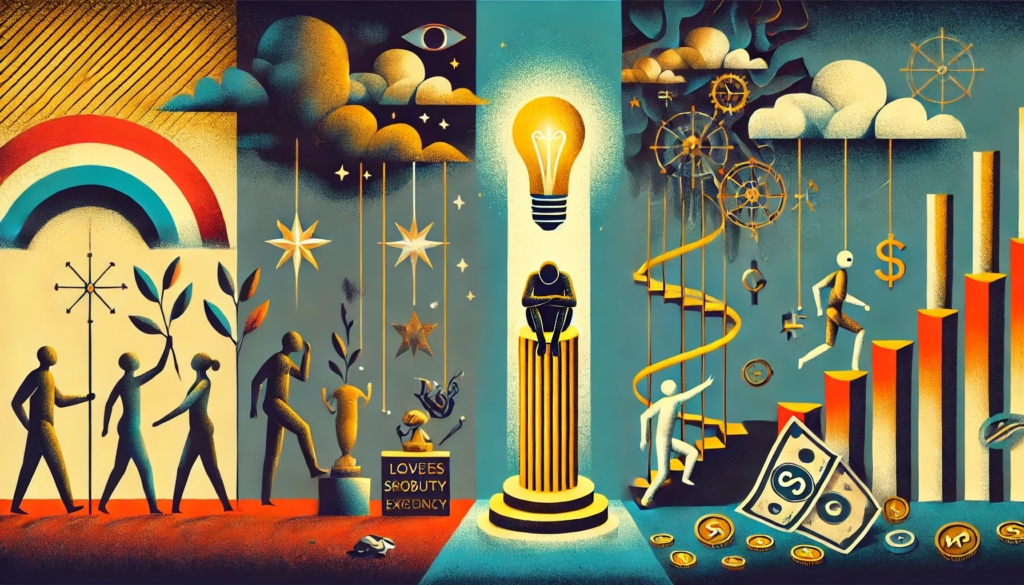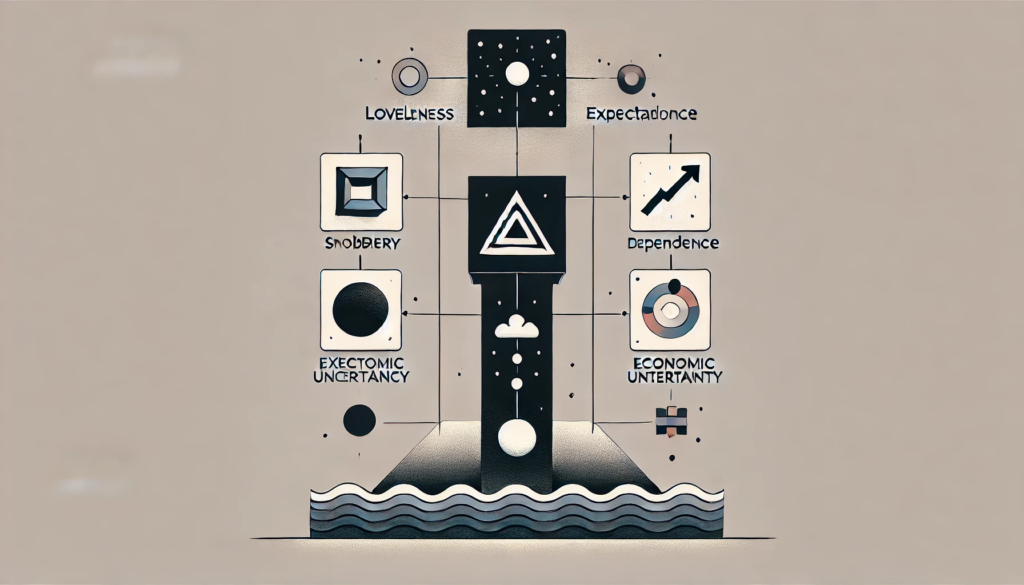
Status Anxiety by Alain de Botton: Expanded Summary
🌟 Introduction: Understanding Status Anxiety
Alain de Botton begins by defining status anxiety as the pervasive fear of losing respect or failing to meet societal expectations. This anxiety stems from our desire to be valued and recognized, which society increasingly ties to material and social achievements. De Botton posits that our modern culture exacerbates these fears by creating environments where individuals’ worth is determined by external validation, like wealth, power, and popularity.
This anxiety is not new but has evolved through history. In traditional aristocratic societies, status was often inherited. In modern meritocratic systems, success is tied to individual effort, which heightens both hope and anxiety.
📜 Historical Context: The Evolution of Status Anxiety
De Botton traces the origins of status anxiety to societal transformations brought about by capitalism, democracy, and meritocracy.
• Aristocratic Societies: In feudal times, status was fixed by birth. A person’s rank was predetermined, eliminating much of the uncertainty and anxiety we face today.
• Capitalism and Democracy: These systems introduced the idea that anyone could achieve success through hard work. While this offers hope, it also places immense pressure on individuals to prove their worth. People are no longer “safe” in their social class and constantly strive for higher positions.
• Meritocracy’s Promise and Peril: The idea that success is based on talent and effort creates a culture of aspiration. However, it also fosters shame and insecurity for those who struggle, as failures are perceived as personal flaws rather than external circumstances.
💔 Sources of Status Anxiety
De Botton identifies five main sources of status anxiety:
1. Lovelessness: The fear of being unloved or unrecognized. Our worth often feels tied to others’ approval.
2. Snobbery: Society’s tendency to value people based on superficial markers like wealth, fame, or beauty. This fosters comparison and envy.
3. Expectation: Rising expectations for success—shaped by consumerism and media—make it harder to feel satisfied with what we have.
4. Dependence: The reliance on others for employment, validation, or survival creates a sense of vulnerability.
5. Economic Uncertainty: Fluctuations in wealth and job security compound fears of losing status.
🖼️ Art and Philosophy: Tools for Relief
De Botton suggests that art and philosophy are powerful tools to combat status anxiety.
• Art: Art reminds us of the universality of human struggle, offering solace by depicting shared experiences of failure, longing, and vulnerability. Examples range from literature to visual arts that capture everyday challenges.
• Philosophy: Philosophers have long critiqued societal values and proposed alternative views on what constitutes a good life. For instance, Stoicism teaches us to focus on what we can control, while existentialism encourages authenticity over conformity.
These perspectives challenge the cultural narrative that equates worth with success, helping individuals detach from external pressures.
🌍 Media and Comparison Culture
Modern media exacerbates status anxiety by providing constant exposure to others’ curated lives. Social media, advertisements, and reality TV amplify the pressure to achieve an unattainable lifestyle. This phenomenon, often called “comparison culture,” distorts our understanding of success and happiness. De Botton stresses the need to distance ourselves from these influences to maintain mental well-being.
💬 Snobbery and Social Judgments
Snobbery—the tendency to judge others based on external markers like job titles, income, or possessions—is a central theme in the book. De Botton critiques this mindset as shallow and destructive. He argues that our value as human beings should not depend on such arbitrary metrics. To combat snobbery, society needs to cultivate greater compassion and inclusivity.
💡 Strategies to Overcome Status Anxiety
De Botton offers several strategies to address status anxiety, focusing on redefining success and embracing inner fulfillment:
1. Reframe Success: Replace materialistic definitions of success with more personal and meaningful ones, such as kindness, creativity, or relationships.
2. Limit Comparisons: Reduce exposure to media and environments that encourage constant comparisons.
3. Embrace Philosophy: Draw on philosophical teachings that prioritize inner peace over societal approval.
4. Find Solace in Art: Seek inspiration and comfort in art that reflects the diversity of human experiences.
5. Cultivate Relationships: Focus on building deep, supportive relationships rather than chasing societal validation.
🏘️ Community and Connection as Antidotes
De Botton emphasizes the importance of community and belonging in reducing status anxiety. Strong interpersonal connections provide a sense of security and affirmation that material achievements cannot. A supportive network can help individuals navigate the pressures of modern life and prioritize what truly matters.
🌟 Redefining Success: The Core Takeaway
Ultimately, “Status Anxiety” calls for a reevaluation of societal values. Success should not be dictated by wealth, fame, or external approval but by individual fulfillment and authentic living. By aligning our goals with intrinsic values rather than societal expectations, we can alleviate the pressures of status anxiety and lead more contented lives.
Expanded Key Points
🌀 Status Anxiety Defined: A fear of losing societal respect, often linked to material or social achievements.
📜 Historical Perspective: Status anxiety evolved with capitalism and democracy, which tied worth to personal achievement.
🏆 Meritocracy’s Flaws: While promoting fairness, meritocracy also intensifies pressure to succeed and fear of failure.
💔 Core Drivers of Anxiety: Lovelessness, snobbery, unrealistic expectations, dependence, and economic instability.
🖼️ Art’s Role: Art provides comfort by reflecting universal struggles and reframing failure.
🌍 Impact of Media: Social and traditional media heighten anxiety by showcasing unattainable lifestyles.
💬 Snobbery’s Effect: Judging people based on status perpetuates insecurity and societal inequality.
💡 Overcoming Anxiety: Strategies include reframing success, embracing philosophy, and finding joy in simple pleasures.
🏘️ Power of Community: Strong relationships counteract societal pressures, offering validation and support.
🌟 Redefining Success: Focusing on inner values over external validation is key to alleviating status anxiety.
Overcoming anxiety, including status anxiety, requires a combination of mindset shifts, lifestyle changes, and practical techniques. Here are methods drawn from Alain de Botton’s Status Anxiety and general psychological practices:
Mindset Shifts
1. Reframe Success:
• Define success in terms of personal values, such as kindness, creativity, and relationships, rather than material or societal metrics.
• Recognize that external validation is fleeting and focus on intrinsic fulfillment.
2. Limit Comparisons:
• Reduce exposure to social media or other platforms that encourage comparing yourself to others.
• Focus on your own progress instead of measuring it against others’ achievements.
3. Practice Self-Compassion:
• Accept imperfections and understand that everyone faces struggles.
• Replace self-criticism with supportive self-talk.
4. Adopt Philosophical Perspectives:
• Stoicism: Focus on what you can control and accept what you cannot.
• Existentialism: Create your own meaning rather than conforming to societal expectations.
Lifestyle Changes
5. Cultivate Relationships:
• Build deep, supportive connections with people who value you for who you are, not what you achieve.
• Engage in communities that share your values.
6. Engage with Art and Literature:
• Find comfort in art, music, and stories that reflect universal human experiences, including struggles and failures.
• Use creative outlets to process emotions.
7. Simplify Your Life:
• Avoid overloading your schedule with activities aimed solely at achieving societal validation.
• Prioritize time for relaxation and personal interests.
8. Set Realistic Goals:
• Break large tasks into smaller, achievable steps to reduce feelings of overwhelm.
• Celebrate incremental progress rather than waiting for big milestones.
Practical Techniques
9. Mindfulness and Meditation:
• Practice mindfulness to stay present and avoid ruminating on the past or future.
• Use guided meditation apps like Calm or Headspace to develop a regular routine.
10. Cognitive Behavioral Techniques (CBT):
• Challenge negative thought patterns that lead to anxiety.
• Replace “What if I fail?” with “How can I learn from this?”
11. Physical Activity:
• Regular exercise reduces anxiety by releasing endorphins and improving physical well-being.
• Try yoga or tai chi, which combine physical movement with mental focus.
12. Reduce Stressors:
• Identify triggers that exacerbate your anxiety and create strategies to manage or avoid them.
• Practice saying “no” to commitments that do not align with your values.
Long-Term Approaches
13. Seek Professional Help:
• Work with a therapist to explore underlying causes of anxiety and develop coping mechanisms.
• Consider group therapy for shared support.
14. Gratitude Practice:
• Regularly list things you’re grateful for to shift focus from what’s lacking to what’s fulfilling in your life.
15. Purpose-Driven Living:
• Pursue activities that bring meaning and align with your personal passions, rather than chasing societal definitions of success.
FAQs on the General Topics of Status Anxiety
Understanding Status Anxiety
Q1: What is status anxiety?
Status anxiety is the fear of not meeting societal expectations or losing social respect due to perceived shortcomings in wealth, success, or influence. It stems from the desire for validation and fear of failure.
Q2: How does society define status?
Status is often defined by external markers such as income, job title, possessions, physical appearance, and social connections. Societal norms frequently equate success with material and social achievements.
Origins of Status Anxiety
Q3: What historical changes led to increased status anxiety?
The transition from aristocratic societies (where status was inherited) to capitalist and democratic systems (where status is earned) increased pressure on individuals to prove their worth through personal achievements.
Q4: Why does meritocracy cause anxiety?
Meritocracy links success to effort and talent, creating both hope and fear. While it rewards hard work, it also blames individuals for failures, amplifying feelings of inadequacy.
Causes of Status Anxiety
Q5: What are the main causes of status anxiety?
The book identifies five key sources:
1. Lovelessness: Fear of being unloved or unrecognized.
2. Snobbery: Judging self-worth based on societal markers.
3. Expectations: Unrealistic benchmarks of success.
4. Dependence: Reliance on others for approval or survival.
5. Economic Insecurity: The fear of financial instability.
Q6: How does comparison fuel status anxiety?
Frequent comparisons, especially through media and social platforms, create unrealistic ideals of success, making individuals feel inadequate.
Impact of Status Anxiety
Q7: What are the psychological effects of status anxiety?
It leads to stress, low self-esteem, depression, and an unhealthy focus on external validation.
Q8: How does status anxiety affect relationships?
It can strain relationships by fostering envy, competition, and a preoccupation with personal success over communal well-being.
Cultural and Social Perspectives
Q9: How does media influence status anxiety?
Media perpetuates ideals of success and beauty, showcasing curated lifestyles that fuel feelings of inadequacy and unattainable expectations.
Q10: What role does snobbery play in status anxiety?
Snobbery creates social hierarchies where individuals are judged by superficial measures like wealth or prestige, deepening insecurities and status-based judgment.
Philosophical Solutions
Q11: How does philosophy help alleviate status anxiety?
Philosophical traditions, such as Stoicism and existentialism, encourage detachment from societal validation and emphasize intrinsic values like wisdom, authenticity, and inner peace.
Q12: What can we learn from philosophers about status?
Philosophers like Seneca, Epicurus, and Montaigne suggest focusing on self-mastery, meaningful connections, and the fleeting nature of societal judgments.
Art and Status Anxiety
Q13: How does art provide relief from status anxiety?
Art reflects universal human struggles, reminding us that failure, longing, and imperfection are shared experiences, not personal deficiencies.
Q14: What types of art are most effective?
Literature, visual arts, and music that explore human vulnerability and resilience can offer solace and perspective.
Strategies for Overcoming Status Anxiety
Q15: How can individuals redefine success?
Success should be aligned with personal values, such as kindness, creativity, and relationships, rather than societal benchmarks like wealth or prestige.
Q16: How can relationships reduce status anxiety?
Supportive relationships provide unconditional acceptance and a sense of belonging, helping to counteract societal pressures.
Q17: What practical steps help combat status anxiety?
• Practice mindfulness and gratitude.
• Limit exposure to comparison-driven media.
• Engage in fulfilling, meaningful activities.
Broader Implications
Q18: How does status anxiety impact society?
It fosters competition, consumerism, and inequality, creating an environment where individuals prioritize external validation over collective well-being.
Q19: Can status anxiety ever be eliminated?
While societal structures make it challenging to eradicate, focusing on personal values, building community, and embracing philosophical insights can significantly reduce its impact.

